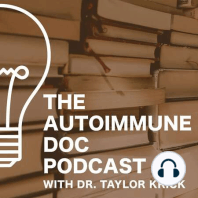30 min listen

024 - Mast Cells, Inflammation, and Autoimmunity
024 - Mast Cells, Inflammation, and Autoimmunity
ratings:
Length:
28 minutes
Released:
Sep 27, 2021
Format:
Podcast episode
Description
Mast cells are important! Mast cells are implicated in autoimmune diseases and many other inflammatory processes - because mast cells RELEASE and TRIGGER inflammation. Like.... A LOT OF INFLAMMATION. We're talking vicious cycles of inflammation that can be hard to stop!Mast cells respond to stimuli in the environment like allergens, foods, viruses, bacteria, parasites, LPS, COVID-19, our "big 3" pathogens EBV, Lyme, mold/fungi/Candida, toxins like mercury, aluminum, glyphosate - but they also can be triggered by PSYCHOLOGICAL STRESS! That's pretty important. These mast cells are called "sentinel cells", because they sound the alarm when there is danger - think of someone with a dog allergy who walks into a friend's house with dogs and immediately their symptoms go off - runny nose, itchy eyes, sneezing. This allergic reaction happens SOMETIMES with mast cell-related problems, but not all the time. The sinuses are the most famous place we find mast cells (think: antihistamines), but they line all tissues that interface with the outside world like the skin, lungs, digestive tract, bladder, uterus/vagina, and highly vascularized tissues like the BRAIN. They are 5-24x more highly expressed in the synovial tissues of patients with RA compared to normal people, they are implicated in Multiple Sclerosis, IBS/IBD, Endometriosis, Alzheimer's disease...the list goes on and on. Their activation is associated with a mixed bag of weird symptoms like anxiety, brain fog, fatigue, heart palpitations, rapid heart rate, vertigo, flushing, itching, heavy limbs, nausea, stomach pain, blood pressure changes, chemical sensitivities, food reactions, etc etc.....so often this person has maybe been to the the ER thinking they were having a heart attack, the cardiologist, the gastroenterologist, the neurologist, the ENT, the endocrinologist....and nothing has helped. These cells are super cool. They literally look like a sack filled with little "balls", or vesicles, and these vesicles are filled with different chemical mediators that have ALL SORTS of different effects - histamine is the most famous, TNFalpha is one of many highly inflammatory cytokines, Platelet Aggregating Factor can cause hypercoagulation....the list is several hundred long. Picture a big bag filled with a bunch of helium balloons. Sometimes the body releases all of the "balloons" at once very quickly, which is called degranulation, but sometimes the body only releases certain balloons - like red ones. Some triggers, like Lyme disease for example, mast cells only release inflammatory cytokines. This is tricky, because this means that sometimes mast cells can be implicated even with there is not a histamine response.SOMETIMES mast cells are activated by allergens. Most people know it when they have allergies. SOMETIMES mast cells are activated by other things - - STRESS, toxins, pathogens, dysbiosis of the gut.....but more often than not it's a combination of things - foods, stress, a toxic exposure, and the inflammation builds more gradually. You can't always find the "one thing" that caused the response, and looking for that "one thing" is futile. Mast cell "activation" and associated inflammation can lead to a wide spectrum of symptom severity - you could have an autoimmune disease like RA or MS that has mast cells as a component but is much more complex, you could have full-blown MCAS (Mast Cell Activation Syndrome - which most people do not have!), you could have bloating, brain fog, and anxiety (COMMON!!) or you could occasionally suffer from minor seasonal allergies or joint pain, common mast cell-mediated inflammatory symptoms. But knowing how mast cells work and how to stabilize them is an important piece of many people's health puzzle!
Released:
Sep 27, 2021
Format:
Podcast episode
Titles in the series (56)
014 - The Thyroid Puzzle - Mechanisms, Lab Ranges, and Most Common Patterns by The Autoimmune Doc Podcast w/ Dr. Taylor Krick